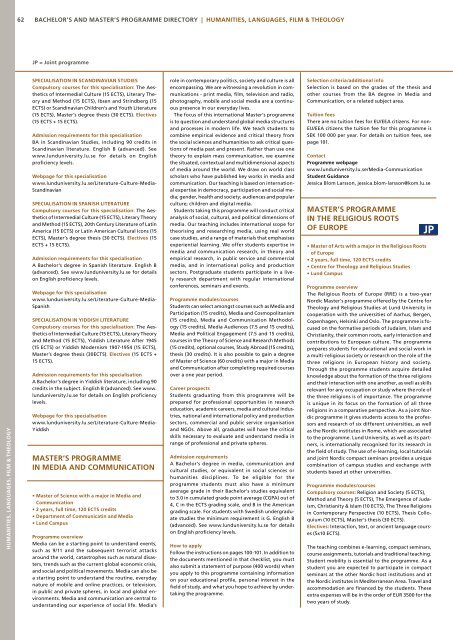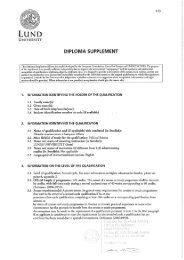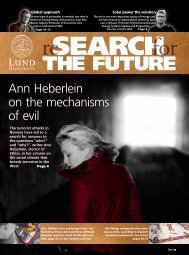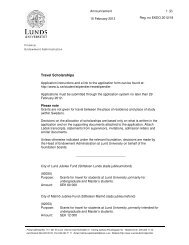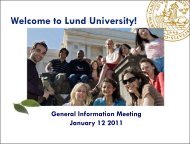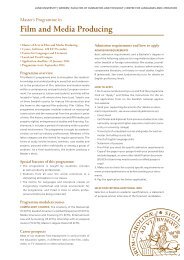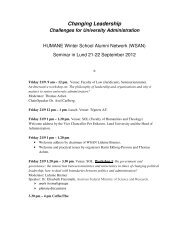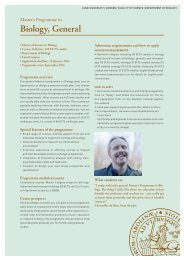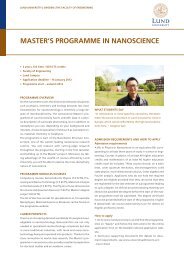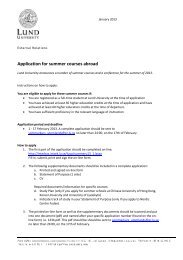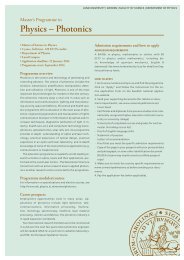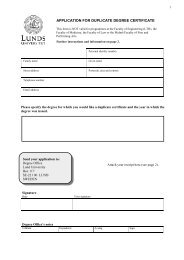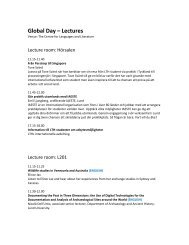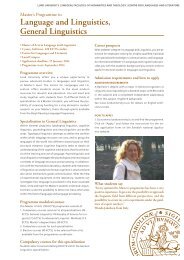Download our 2014/15 international student ... - Lund University
Download our 2014/15 international student ... - Lund University
Download our 2014/15 international student ... - Lund University
You also want an ePaper? Increase the reach of your titles
YUMPU automatically turns print PDFs into web optimized ePapers that Google loves.
62 Bachelor’s and Master’s programme directory | Humanities, Languages, Film & Theologyjp = Joint programmeHumanities, Languages, Film & Theologyspecialisation in scandinavian studiesCompulsory c<strong>our</strong>ses for this specialisation: The Aestheticsof Intermedial Culture (<strong>15</strong> ECTS), Literary Theoryand Method (<strong>15</strong> ECTS), Ibsen and Strindberg (<strong>15</strong>ECTS) or Scandinavian Children’s and Youth Literature(<strong>15</strong> ECTS), Master’s degree thesis (30 ECTS). Electives(<strong>15</strong> ECTS + <strong>15</strong> ECTS).Admission requirements for this specialisationBA in Scandinavian Studies, including 90 credits inScandinavian literature. English B (advanced). Seewww.lunduniversity.lu.se for details on Englishproficiency levels.Webpage for this specialisationwww.lunduniversity.lu.se/Literature-Culture-Media-Scandinavianspecialisation in spanish literatureCompulsory c<strong>our</strong>ses for this specialisation: The Aestheticsof Intermedial Culture (<strong>15</strong> ECTS), Literary Theoryand Method (<strong>15</strong> ECTS), 20th Century Literature of LatinAmerica (<strong>15</strong> ECTS) or Latin American Cultural Icons (<strong>15</strong>ECTS), Master’s degree thesis (30 ECTS). Electives (<strong>15</strong>ECTS + <strong>15</strong> ECTS).Admission requirements for this specialisationA Bachelor’s degree in Spanish literature. English B(advanced). See www.lunduniversity.lu.se for detailson English proficiency levels.Webpage for this specialisationwww.lunduniversity.lu.se/Literature-Culture-Media-Spanishspecialisation in yiddish literatureCompulsory c<strong>our</strong>ses for this specialisation: The Aestheticsof Intermedial Culture (<strong>15</strong> ECTS), Literary Theoryand Method (<strong>15</strong> ECTS), Yiddish Literature After 1945(<strong>15</strong> ECTS) or Yiddish Modernism 1907-1954 (<strong>15</strong> ECTS),Master’s degree thesis (30ECTS). Electives (<strong>15</strong> ECTS +<strong>15</strong> ECTS).Admission requirements for this specialisationA Bachelor’s degree in Yiddish literature, including 90credits in the subject. English B (advanced). See www.lunduniversity.lu.se for details on English proficiencylevels.Webpage for this specialisationwww.lunduniversity.lu.se/Literature-Culture-Media-YiddishMaster’s Programmein media and communication• Master of Science with a major in Media andCommunication• 2 years, full time, 120 ECTS credits• Department of Communicatin and Media• <strong>Lund</strong> CampusProgramme overviewMedia can be a starting point to understand events,such as 9/11 and the subsequent terrorist attacksaround the world, catastrophes such as natural disasters,trends such as the current global economic crisis,and social and political movements. Media can also bea starting point to understand the routine, everydaynature of mobile and online practices, or television,in public and private spheres, in local and global environments.Media and communication are central tounderstanding <strong>our</strong> experience of social life. Media’srole in contemporary politics, society and culture is allencompassing. We are witnessing a revolution in communications- print media, film, television and radio,photography, mobile and social media are a continuouspresence in <strong>our</strong> everyday lives.The focus of this <strong>international</strong> Master’s programmeis to question and understand global media structuresand processes in modern life. We teach <strong>student</strong>s tocombine empirical evidence and critical theory fromthe social sciences and humanities to ask critical questionsof media past and present. Rather than use onetheory to explain mass communication, we examinethe situated, contextual and multidimensional aspectsof media around the world. We draw on world classscholars who have published key works in media andcommunication. Our teaching is based on <strong>international</strong>expertise in democracy, participation and social media;gender, health and society; audiences and popularculture; children and digital media.Students taking this programme will conduct criticalanalysis of social, cultural, and political dimensions ofmedia. Our teaching includes <strong>international</strong> scope fortheorising and researching media, using real worldcase studies, and a range of materials that emphasisesexperiential learning. We offer <strong>student</strong>s expertise inmedia and communication research, in theory andempirical research, in public service and commercialmedia, and in <strong>international</strong> policy and productionsectors. Postgraduate <strong>student</strong>s participate in a livelyresearch department with regular <strong>international</strong>conferences, seminars and events.Programme modules/c<strong>our</strong>sesStudents can select amongst c<strong>our</strong>ses such as Media andParticipation (<strong>15</strong> credits), Media and Cosmopolitanism(<strong>15</strong> credits), Media and Communication Methodology(<strong>15</strong> credits), Media Audiences (7.5 and <strong>15</strong> credits),Media and Political Engagement (7.5 and <strong>15</strong> credits),c<strong>our</strong>ses in the Theory of Science and Research Methods(<strong>15</strong> credits), optional c<strong>our</strong>ses, Study Abroad (<strong>15</strong> credits),thesis (30 credits). It is also possible to gain a degreeof Master of Science (60 credits) with a major in Mediaand Communication after completing required c<strong>our</strong>sesover a one year period.Career prospectsStudents graduating from this programme will beprepared for professional opportunities in researcheducation, academic careers, media and cultural industries,national and <strong>international</strong> policy and productionsectors, commercial and public service organisationand NGOs. Above all, graduates will have the criticalskills necessary to evaluate and understand media inrange of professional and private spheres.Admission requirementsA Bachelor’s degree in media, communication andcultural studies, or equivalent in social sciences orhumanities disciplines. To be eligible for theprogramme <strong>student</strong>s must also have a minimumaverage grade in their Bachelor’s studies equivalentto 3.0 in cumulated grade point average (CGPA) out of4, C in the ECTS grading scale, and B in the Americangrading scale. For <strong>student</strong>s with Swedish undergraduatestudies the minimum requirement is G. English B(advanced). See www.lunduniversity.lu.se for detailson English proficiency levels.How to applyFollow the instructions on pages 100-101. In addition tothe documents mentioned in that checklist, you mustalso submit a statement of purpose (400 words) whenyou apply to this programme containing informationon y<strong>our</strong> educational profile, personal interest in thefield of study, and what you hope to achieve by undertakingthe programme.Selection criteria/additional infoSelection is based on the grades of the thesis andother c<strong>our</strong>ses from the BA degree in Media andCommunication, or a related subject area.Tuition feesThere are no tuition fees for EU/EEA citizens. For non-EU/EEA citizens the tuition fee for this programme isSEK 100 000 per year. For details on tuition fees, seepage 101.ContactProgramme webpagewww.lunduniversity.lu.se/Media-CommunicationStudent GuidanceJessica Blom Larsson, jessica.blom-larsson@kom.lu.seMaster’s Programmein The Religious Rootsof Europe• Master of Arts with a major in the Religious Rootsof Europe• 2 years, full time, 120 ECTS credits• Centre for Theology and Religious Studies• <strong>Lund</strong> CampusProgramme overviewThe Religious Roots of Europe (RRE) is a two-yearNordic Master’s programme offered by the Centre forTheology and Religious Studies at <strong>Lund</strong> <strong>University</strong> incooperation with the universities of Aarhus, Bergen,Copenhagen, Helsinki and Oslo. The programme is focusedon the formative periods of Judaism, Islam andChristianity, their common roots, early interaction andcontributions to European culture. The programmeprepares <strong>student</strong>s for educational and social work ina multi-religious society or research on the role of thethree religions in European history and society.Through the programme <strong>student</strong>s acquire detailedknowledge about the formation of the three religionsand their interaction with one another, as well as skillsrelevant for any occupation or study where the role ofthe three religions is of importance. The programmeis unique in its focus on the formation of all threereligions in a comparative perspective. As a joint Nordicprogramme it gives <strong>student</strong>s access to the professorsand research of six different universities, as wellas the Nordic institutes in Rome, which are associatedto the programme. <strong>Lund</strong> <strong>University</strong>, as well as its partners,is <strong>international</strong>ly recognised for its research inthe field of study. The use of e-learning, local tutorialsand joint Nordic compact seminars provides a uniquecombination of campus studies and exchange with<strong>student</strong>s based at other universities.Programme modules/c<strong>our</strong>sesCompulsory c<strong>our</strong>ses: Religion and Society (5 ECTS),Method and Theory (5 ECTS), The Emergence of Judaism,Christianity & Islam (10 ECTS), The Three Religionsin Contemporary Perspective (10 ECTS), Thesis Colloquium(10 ECTS), Master’s thesis (30 ECTS).Electives: Interaction, text, or ancient language c<strong>our</strong>ses(5x10 ECTS).The teaching combines e-learning, compact seminars,c<strong>our</strong>se assignments, tutorials and traditional teaching.Student mobility is essential to the programme. As a<strong>student</strong> you are expected to participate in compactseminars at the other Nordic host institutions and atthe Nordic institutes in Mediterranean Area. Travel andaccommodation are financed by the <strong>student</strong>s. Theseextra expenses will be in the order of EUR 3500 for thetwo years of study.


